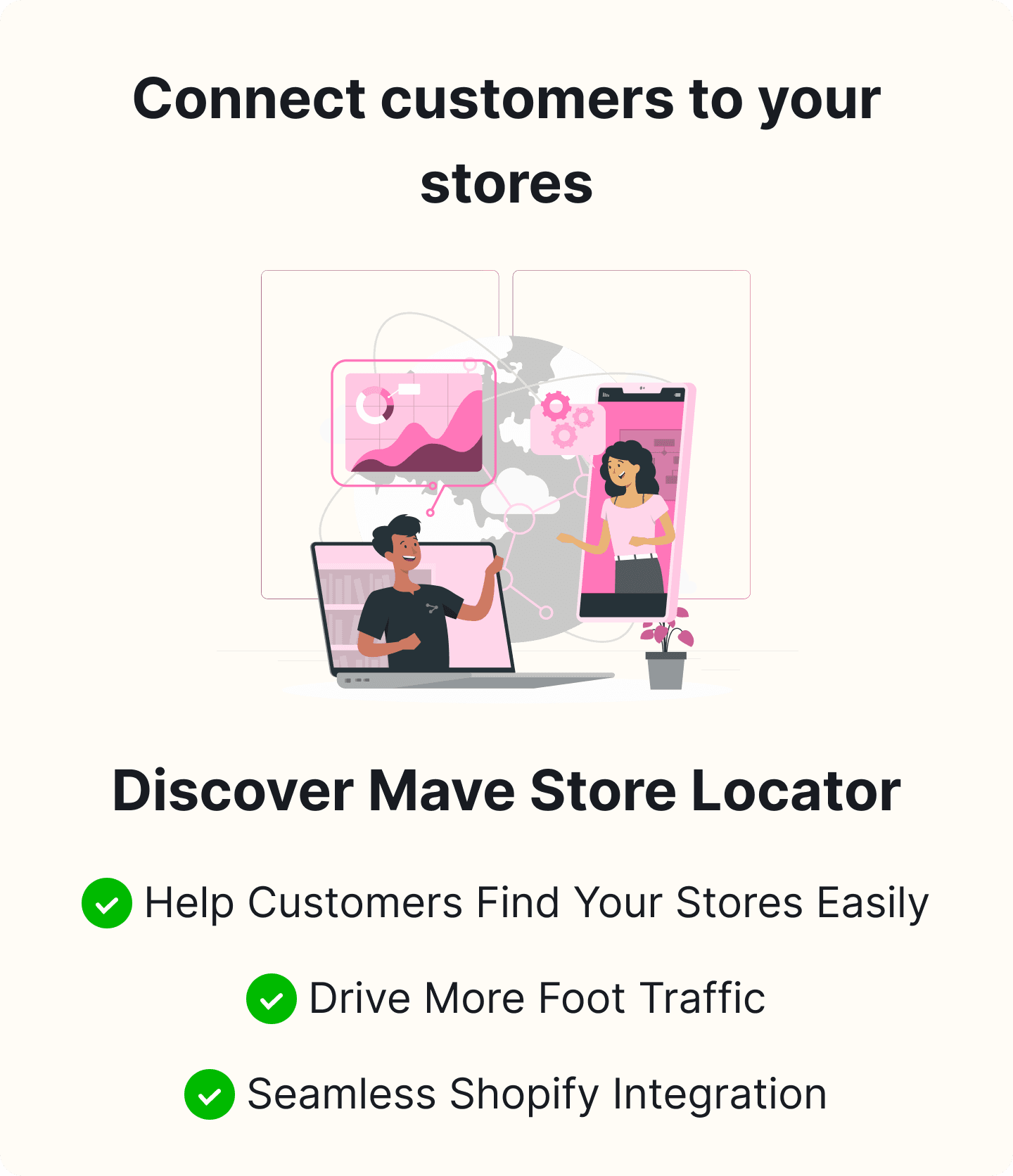What to Look for in a Store Locator App for Your Shopify Store
Table of Content

Finding the best store locator for your business can significantly impact how customers connect with your physical locations. Whether you run a single boutique or manage hundreds of retail outlets, helping customers find your stores quickly has become essential for business success.
However, choosing the right Shopify Store Locator App isn't as straightforward as it might seem. Each solution comes with different features, pricing models, and technical requirements that can affect your store's performance. In fact, the wrong choice could lead to frustrated customers and lost sales opportunities.
This comprehensive guide will help you evaluate and select the perfect Shopify Store Locator features for your specific needs. We'll explore everything from essential functionality to pricing considerations, ensuring you make an informed decision that benefits both your business and customers.
Understanding Your Store Locator Needs
Before selecting a store locator app, understanding your specific business requirements plays a crucial role in making the right choice. According to recent data, 80% of shopping still happens in physical stores, making it essential to bridge the gap between your online presence and brick-and-mortar locations.
Identifying your business type and customer base
Understanding your target audience goes beyond basic demographics. Your store locator needs depend largely on your customer shopping patterns and geographical reach. For instance, many consumers prefer browsing products online but making final purchases in-store. Additionally, customers often use their phones to find nearby stores, with 31% of on-the-go customers relying on mobile devices for store location searches.
Single location vs. multi-location requirements
The complexity of your store locator needs varies based on your business scale:
Single Location Businesses:
-
Simple location list display
-
Basic contact information and operating hours
-
Straightforward navigation options
Multi-Location Operations:
-
Advanced search capabilities with filtering options
-
Inventory tracking at granular levels
-
Multiple staging locations for different purposes
Key features to consider for your industry
Based on your business type, certain features become more critical than others:
Essential Functionality:
-
Geolocation detection for automatic customer location identification
-
Distance-based filtering to show nearest stores
-
Mobile responsiveness for on-the-go searches
Advanced Capabilities:
-
Product availability filters for inventory management
-
Category-specific search options
-
Integration with Google Business Profile for real-time updates
Moreover, businesses must consider data privacy regulations, as a majority of U.S. states now have specific data privacy laws in place. Therefore, choosing a store locator that prioritizes customer data protection while maintaining transparency about data collection practices becomes paramount.
The store locator should also support your omnichannel strategy. As the boundaries between online and offline channels continue to blur, implementing a robust store locator helps create a seamless shopping experience. Furthermore, the ability to analyze customer behavior through store locator interactions provides valuable insights for business growth and location optimization.
When evaluating store locator options, consider features that enhance customer convenience, such as:
-
Real-time inventory updates
-
Detailed store information display
-
Integration with mapping services
-
Mobile-friendly interface
These elements work together to create a comprehensive solution that not only guides customers to your physical locations but also strengthens your overall brand presence and customer experience.
Essential Features of Top Store Locator Apps
Modern store locator apps pack powerful features that enhance both customer experience and business operations. Let's explore the core functionalities that make these tools indispensable for Shopify stores.
Search functionality and filtering options
Advanced search capabilities stand at the forefront of top-tier store locator applications. These apps offer multiple search methods, including location-based searches, store name queries, and product-specific lookups. Smart autocomplete suggestions streamline the search process, while geolocation features automatically detect customer positions for faster results.
Key filtering capabilities include:
-
Distance-based filtering for proximity searches
-
Product availability filters
-
Store type categorization
-
Custom tag-based filtering
Mobile responsiveness and user experience
A seamless mobile experience remains crucial since most customers search for store locations on their smartphones. Store locator apps now feature HTML5 responsive interfaces that adapt perfectly to any device size. This optimization ensures consistent performance across desktops, tablets, and mobile phones.
The user interface prioritizes:
-
Quick loading times
-
Clean, uncluttered layouts
-
Easy-to-tap buttons and controls
-
Smooth map interactions
Customization capabilities
Store locator apps offer extensive customization options to match your brand identity. Merchants can personalize various elements:
Visual Elements:
-
Custom map markers and icons
-
Brand-specific color schemes
-
Layout modifications
-
Custom CSS implementation
Content Display:
-
Location detail pages
-
Product connections
-
Meta tags integration
-
Multiple page layouts
Integration with Google Maps
Google Maps integration serves as the backbone of modern store locator solutions. This partnership brings several advantages:
Core Features:
-
Accurate address display
-
Interactive mapping
-
Real-time directions
-
Multiple location markers
Enhanced Functionality:
-
Business hours display
-
Google reviews integration
-
Custom map styling options
-
Unlimited location support
The integration likewise enables comprehensive information cards that display vital details such as:
-
Complete address information
-
Contact numbers
-
Email addresses
-
Operating hours
-
Location images
Store locator analytics provide valuable insights into customer search patterns and store performance. These tools track which locations receive the most searches, helping businesses make informed decisions about resource allocation and marketing strategies.
For optimal performance, leading store locator apps incorporate bulk import/export capabilities, allowing merchants to manage multiple locations efficiently. Furthermore, these applications support various data synchronization methods, including Google Drive integration and automated updates.
The most effective store locator solutions combine these features while maintaining simplicity in implementation. This balance ensures that both customers and store owners can utilize the full range of functionalities without technical complications.
Comparing Pricing Models and Value
Store locator apps offer diverse pricing structures that cater to businesses of all sizes. Understanding these pricing models remains essential for making cost-effective decisions that align with your business goals.
Free vs. paid store locator apps
Many Shopify store locator apps provide free basic plans, particularly beneficial for small businesses or startups. Closeby, specifically, offers a complimentary plan supporting up to five locations with basic customization features. Similarly, MSPL Store Locator provides free access for up to three locations.
Paid versions unlock advanced capabilities:
-
Unlimited location support
-
Enhanced customization options
-
Premium analytics tools
-
Bulk import functionalities
Understanding pricing tiers and limitations
Store locator apps typically structure their pricing based on:
Location-Based Tiers:
-
Basic plans (1-50 locations): USD 9.99/month
-
Mid-tier plans (51-500 locations): USD 19.99/month
-
Enterprise plans (501-2000 locations): USD 39.99/month
Calculating ROI for your store locator
Determining the return on investment helps justify the expense of a store locator app. The basic ROI formula calculates the percentage of profit relative to investment:
-
ROI = (Growth in Sales - Marketing Costs) / Marketing Costs × 100
Consider these factors when evaluating ROI:
Direct Benefits:
-
Increased foot traffic
-
Higher conversion rates
-
Enhanced customer satisfaction
Cost Considerations:
-
Initial setup expenses
-
Monthly subscription fees
-
Maintenance costs
-
Technical support requirements
To maximize ROI, evaluate:
-
Current costs for solving location-finding challenges
-
Current costs for solving location-finding challenges
-
License fees and pricing structure scalability
-
Additional hardware or software requirements
A comprehensive ROI assessment should factor in:
-
Transaction fees (ranging from 0.5% to 3%)
-
Integration costs with existing systems
-
Training requirements for staff
-
Potential revenue increase from improved customer experience
Remember to account for both immediate and long-term benefits. While some apps might have higher upfront costs, their advanced features could generate greater returns through improved customer experience and increased store visits.
For optimal value assessment, consider:
-
Monthly active users
-
Search-to-visit conversion rates
-
Customer feedback metrics
-
Store traffic patterns
By carefully analyzing these elements alongside your business requirements, you can select a store locator solution that delivers the best value while staying within budget constraints.
Technical Considerations for Implementation
Implementing a store locator app requires careful consideration of technical aspects to ensure smooth operation. Let's explore the key technical factors that influence successful implementation.
Compatibility with your Shopify theme
Store locator apps must align seamlessly with Shopify's latest OS 2.0 framework. Recent updates enable merchants to place store locator maps anywhere using App Block functionality, offering enhanced flexibility. This compatibility ensures the app maintains functionality even when switching themes.
Key compatibility features:
-
Works with latest Shopify themes
-
Responsive design across devices
-
Speed-tested for traffic spikes
-
ADA-compliant layouts
Setup complexity and technical requirements
Most modern store locator apps prioritize user-friendly implementation. Rather than complex coding, these solutions offer straightforward installation processes:
Installation methods:
-
One-time copy-paste installation
-
Automatic updates post-installation
-
Direct integration through admin panel
-
Theme-specific template options
For merchants using Online Store 2.0, the implementation process offers two distinct approaches:
Page-specific integration:
-
Easier setup process
-
Universal theme compatibility
-
Automatic theme migration support
Template-based implementation:
-
Greater content block flexibility
-
Enhanced customization options
-
Theme-dependent configuration
Data import options for multiple locations
Managing multiple store locations demands efficient data handling systems. Contemporary store locator apps support various data import methods:
Bulk upload capabilities:
-
CSV file imports
-
Excel spreadsheet compatibility
-
Google Sheets synchronization
-
Automated location updates
The data management dashboard streamlines location updates through:
-
Bulk import/export functionality
-
Real-time synchronization
-
Automatic geocoding for new locations
-
Custom field mapping options
Beyond basic implementation, store locator apps offer advanced technical features that enhance performance:
-
Automatic coordinate generation
-
Distance-based search capabilities
-
Custom meta field support
-
Multi-location inventory tracking
These technical considerations ensure your store locator not only functions effectively but also scales with your business growth. The implementation process focuses on maintaining website speed while delivering robust functionality. Through proper technical setup, merchants can create a seamless store location experience that enhances customer satisfaction and drives foot traffic to physical stores.
Conclusion
Selecting the right store locator app stands as a crucial decision for any Shopify merchant with physical locations. Though numerous options exist in the market, success lies in matching your specific business requirements with the right solution.
Small businesses might find Mave Locator free tier perfectly adequate, while large enterprises could benefit from Amai ProMap's robust features. The key factors - technical compatibility, customization options, and pricing structure - should guide your final choice.
Remember that store locator apps do more than just point customers to your locations. These tools provide valuable insights into customer behavior, help manage multiple locations efficiently, and create seamless shopping experiences across digital and physical channels.
Start with a clear assessment of your needs, evaluate the available options based on our comprehensive guide, and choose a solution that aligns with both your current requirements and future growth plans. A well-implemented store locator will not only boost foot traffic but also strengthen your overall retail presence.

Thilak
Thilak is the Co-founder & COO at Appracadabra, helping businesses streamline their Shopify app management. His expertise in eCommerce and product development enables him to craft innovative tools that simplify operations and drive growth for online merchants.
